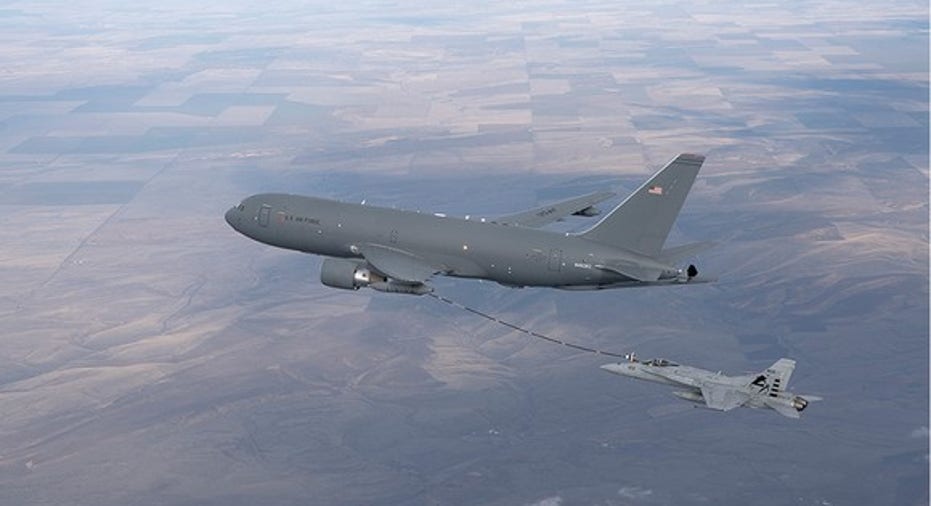Boeing Earnings: The Defense Edition

By now you've probablyheard the news: Boeing (NYSE: BA) beat on Q4 earnings, and its stock is off to the races.
Boeing stock surged 5% last Wednesday after the company reported analyst-estimate-beating profits of $7.61 per share, and it promised to grow "core earnings" by at least 25% in 2017 despite a sharp slowdown in sales of new commercial jets. And yes, all of this is good news -- but what defense investors really want to know is how Boeing's defense business is doing.
So, let's talk about that.
Boeing's KC-46 tanker is one of only a few Boeing aircraft whose deliveries are guaranteed to increase in years to come. Image source: Boeing.
Boeing Defense
In addition to being the world's biggest producer of commercial airplanes, Boeing is also one of the world's biggest defense businesses -- and this is key to understanding Boeing stock. Commercial Airplanes may provide 69% of Boeing's revenue, but according to data from S&P Global Market Intelligence, Commercial Airplanes contributes only 54% of the company's profits. The bulk of Boeing's remaining business comes from its big Defense, Space & Security division, which comprises three parts: Military Aircraft, Network & Space Systems, and Global Services & Support.
Combined, these three units produce $29.5 billion in revenue annually -- less than half of Boeing's sales from Commercial Airplanes. But they earn Boeing $3 billion in profits -- nearly as much as the $3.1 billion that Boeing earns from a Commercial Airplanes business that's twice as big. In total, Boeing Defense, Space & Security boasts a 10.2% operating profit margin that's more than twice as robust as the 4.8% margin Boeing's civilian business earns.
In short, Boeing Defense is arguably Boeing's most important business.
Defense is big business -- but business isn't booming
This gives some cause for concern, because 2016 wasn't exactly a great year for Boeing's defense business. $29.5 billion in sales may sound like a big number, but it was actually down 3% for Boeing in 2016. Combined with a 60-basis-point slippage in operating profit margins, operating profits at Boeing Defense declined 8% year over year.
Deliveries-wise, Boeing reported increases in the pace of deliveries of P-8 Poseidon sub-hunting aircraft (18 units delivered, versus 14 in 2015), in F-15 fighter jets (15 versus 12 in 2015), and new and remanufactured AH-64 Apache attack helicopters (65 versus 61). On the other hand, deliveries of C-17 Globemaster transport aircraft declined (from five in 2015 to four in 2016), as did deliveries of F/A-18 fighters (35 in 2015, dropping to 25 in 2016), and CH-47 Chinook helicopters (57 new and remanufactured units delivered in 2015, falling to 50 deliveries in 2016).
Looking forward, Boeing noted that its defense business still has $57 billion in backlog going into 2017, and it boasted that 37% of this future revenue will come from international customers. What Boeing failed to mention was that last year, defense backlog stood at $58 billion, with 40% coming from the all-important global growth market. And in 2017 in particular, Boeing's guidance calls for total defense revenue of between $28 billion and $29 billion -- about $1 billion less than Boeing collected in 2016.
Granted, all of this news came before the Pentagon announceda big $2.1 billion buy of Boeing's KC-46 refueling tankers. But the long story short is still this: Boeing's defense business shrank in 2016, it looks likely to shrink further in 2017, and it will probably fall even further in years to come.
10 stocks we like better than Boeing When investing geniuses David and Tom Gardner have a stock tip, it can pay to listen. After all, the newsletter they have run for over a decade, Motley Fool Stock Advisor, has tripled the market.*
David and Tom just revealed what they believe are the 10 best stocks for investors to buy right now...and Boeing wasn't one of them! That's right -- they think these 10 stocks are even better buys.
Click here to learn about these picks!
*Stock Advisor returns as of January 4, 2017.
Rich Smith has no position in any stocks mentioned. The Motley Fool has no position in any of the stocks mentioned. The Motley Fool has a disclosure policy.



















